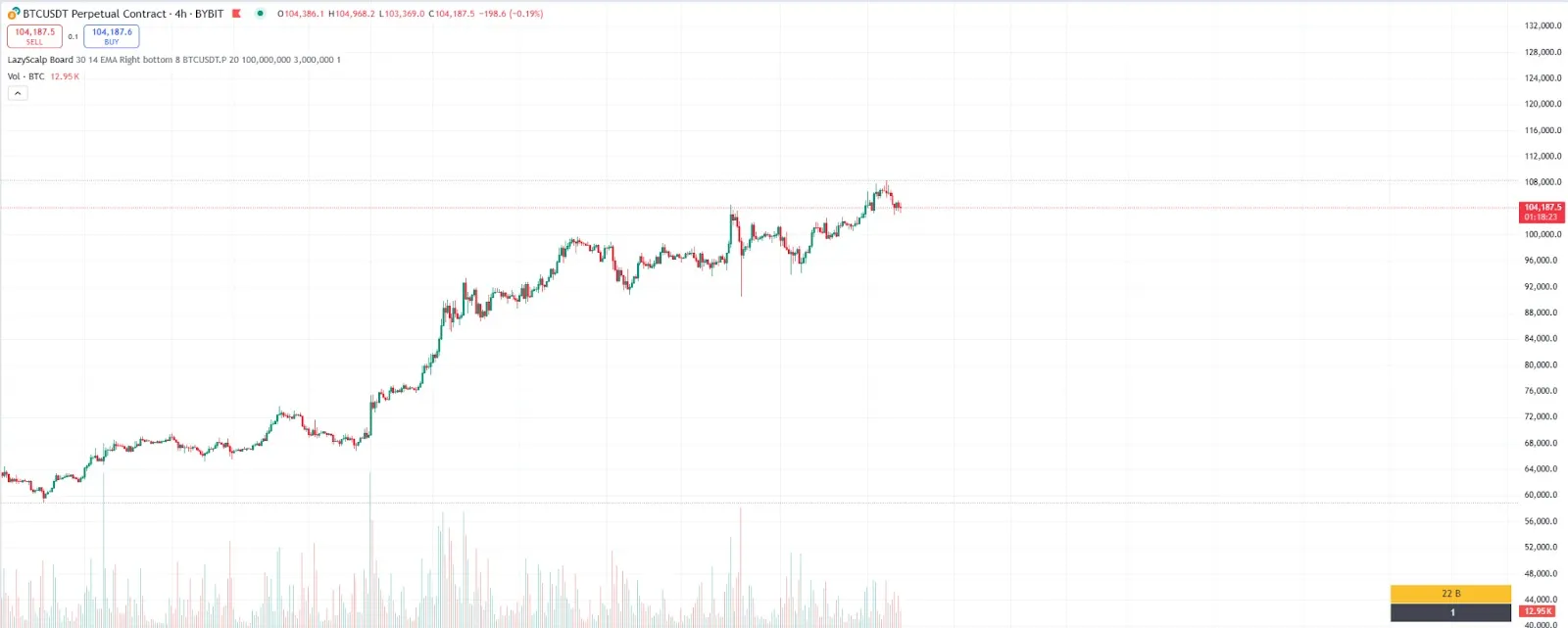
Bitcoin Price Forecast for 2025 and What Affects It

The bitcoin exchange rate continues to be one of the most discussed topics in the world of finance. Despite its volatility, bitcoin remains the leading cryptocurrency capable of dictating trends for the entire digital asset market. Predictions for 2025 are of great interest to investors, traders and analysts.
What factors influence the bitcoin forecast
The bitcoin exchange rate is influenced by many fundamental factors, let’s look at the most important ones.
Halving
Halving (or reducing the block reward) is a key event in the bitcoin ecosystem that occurs roughly every four years. The basic idea is that the reward for mining a block is halved, causing the rate of new coins to decrease. This mechanism controls inflation and makes bitcoin a scarce asset, which has historically affected its price:
-
Reduced supply: As the rate of issuance of new coins decreases, the supply of bitcoin in the market decreases, which, if demand is stable or increasing, contributes to the price.
-
Increased investor interest: Historically, halvings have caused a surge in interest in the cryptocurrency, often leading to an increase in its value.
-
Example: Recent halwings (2012, 2016, 2024) have been accompanied by prolonged bull markets. The next halving is expected in 2028 and is already triggering growth forecasts.
Volatility and external factors

Bitcoin is known for its high volatility, which can both attract and deter investors. Volatility depends on a variety of factors including:
-
Macroeconomic conditions: Global events such as inflation, economic crises, and interest rate changes directly affect the cryptocurrency market. For example, bitcoin is often seen as “digital gold” during times of economic instability.
-
Actions of major players: Market manipulation by whales (large holders of bitcoin) can drastically change the exchange rate.
-
News background: News of bitcoin’s acceptance as a means of payment or restrictions on its use can cause sharp fluctuations in the price.
-
Influence of other cryptocurrencies: The rise or fall of other cryptocurrencies, such as Ethereum, can also have an impact on bitcoin.
Regulation and laws
Legal regulation of cryptocurrencies plays a huge role in bitcoin price predictions.
-
National adoption: Legalizing bitcoin, as happened in El Salvador, can increase its value by increasing demand.
-
Restrictions: Bans, taxes or severe restrictions on the use of cryptocurrencies in countries such as China could negatively impact the exchange rate.
-
Regulations for institutional investors: Increased controls or easier access for large organizations can both stimulate growth and limit market activity.
Optimistic forecasts
Many experts and analysts make positive predictions for bitcoin based on its unique characteristics and role in the global economy:
-
Scarcity and halving: With each halving, bitcoin becomes a rarer asset, which increases its value.
-
Increased use: Bitcoin’s increased popularity as a means of saving, payment, and investment could lead to sustained growth.
-
Analyst Predictions: Some experts believe bitcoin could reach price points of $200,000 or higher in the coming years.
Pessimistic predictions
On the other hand, there are a number of factors that could negatively affect the bitcoin price:
-
Regulatory restrictions: Increased scrutiny or bans on cryptocurrencies in major economies (e.g. US or EU).
-
Decreased interest: If large investors and companies start to favor other assets or technologies.
-
Technical issues: Possible vulnerabilities in the bitcoin network or scaling failures.
-
Competitor market: The strengthening position of other blockchains (Ethereum, Solana) could draw capital away from bitcoin.
Why bitcoin has an optimistic trend
Bitcoin’s optimistic trend is due to a number of factors that are related to economic, technological and social aspects. Let’s consider them in detail:
1. Growing institutional interest
-
Recognition of bitcoin as an investment asset: More and more institutional investors (funds, banks, companies) are including bitcoin in their portfolios. For example, companies such as Tesla and MicroStrategy have already invested in bitcoin.
-
Bitcoin futures and ETFs: The launch of bitcoin exchange-traded funds (ETFs) in the U.S. and other countries makes the cryptocurrency more accessible to traditional investors.
2. Limited issuance
-
Supply shortage: Bitcoin has a fixed limit of 21 million coins, making it analogous to digital gold. When demand increases, the limited supply leads to a higher price.
-
Halving (decreasing mining rewards): Halving occurs every four years, which reduces the rate of issuance of new bitcoins and increases scarcity.
3. Macroeconomic factors
-
Inflation and depreciation of fiat currencies: With inflation and volatile national currencies, investors are looking for alternative ways to preserve capital. Bitcoin, as a limited-issue asset, is perceived as a hedge against inflation.
-
Global economic crises: The deterioration of the global economy is pushing people to seek safe harbors.
4. technological progress and infrastructure development
-
Lightning Network: Faster transactions and lower fees, making bitcoin more convenient for daily use.
-
Development of exchanges and services: The increase in the number of crypto exchanges, wallets and payment systems makes it easier for new users to access cryptocurrencies.
5. Popularization and social acceptance
-
Acceptance as legal tender: For example, El Salvador has recognized bitcoin as an official currency. This sets precedents for other countries.
-
Increased trust among the public: The perception of bitcoin as a tool only for speculation or illegal activities is gradually disappearing.
6. Increased regulation
-
Regulatory clarity: The introduction of clearer rules of the game makes bitcoin more attractive to big players. For example, the legalization of cryptocurrency transactions in a number of countries is boosting confidence.
-
Fighting fraud: Tighter oversight eliminates questionable projects and strengthens bitcoin’s reputation.
7. Global digitalization trends
-
Popularization of Web3 and blockchain technologies: Bitcoin is perceived as a symbol of decentralized technologies, and its popularity is fueled by the general interest in blockchain.
-
Increasing share of digital assets: The gradual shift to digital forms of money and assets makes bitcoin an important element of the future financial system.
Trump’s Role in Shaping the Bitcoin Forecast

Donald Trump’s role in shaping the bitcoin forecast cannot be seen as directly determinative, but his political actions, economic policies, and public statements have influenced several key aspects that are related to the cryptocurrency market. Let’s examine this role in detail:
1. Economic policy and increased inflation expectations
- Large-scale government spending:
During Trump’s presidency, especially in 2020 in response to the COVID-19 pandemic, the US enacted trillions of dollars in financial aid packages. This measure has increased the money supply and heightened inflationary expectations.
How this affects bitcoin: Many investors have begun to see bitcoin as “digital gold” and a hedge against inflation, which has caused its popularity to rise.
- Tax cuts: Trump’s tax reform cut corporate taxes, leaving companies with more free cash. Some of these funds could have been invested in cryptocurrencies, as Tesla or MicroStrategy did (later, but riding the wave of this trend).
2. Global political instability and the role of bitcoin as an alternative
- Trade war with China: The conflict between the US and China has increased economic uncertainty in global markets.
Positive impact on bitcoin: It prompted investors to look for assets independent of the influence of specific countries, among which bitcoin proved to be the most attractive.
- Sanctions against other countries: The Trump administration has increased sanctions policies against countries such as Iran and Venezuela. This resulted in limiting their access to international financial systems.
Result: Bitcoin began to be used in these countries as a means of payment and savings, which helped increase global demand for the cryptocurrency.
3. Popularization of the theme of decentralization
- Criticism of centralized institutions: Trump’s political rhetoric has often been directed against the “deep state,” the Federal Reserve, and other centralized institutions.
As it relates to bitcoin: This rhetoric resonated with cryptocurrencies’ philosophy of decentralization and independence from the state, increasing public interest in alternative financial systems.
4. Indirect development of bitcoin infrastructure through regulation
- Focus on regulation of the crypto market: Under Trump, the cryptocurrency market has come under the scrutiny of regulators such as the SEC (Securities and Exchange Commission) and FinCEN (Financial Crimes Enforcement Network).
Benefit: While increased regulation has caused short-term problems for crypto projects, in the long term it has built confidence in bitcoin as a legitimate asset and helped to cleanse the market of fraud.
5. Distrust of the Federal Reserve
- Criticism of the Federal Reserve for managing the money supply: Trump has often criticized the Federal Reserve for its high interest rates and its actions to regulate the economy. This criticism has emphasized the problems of fiat currencies.
The role of bitcoin: Bitcoin is perceived as an alternative to a system run by central banks. Increased distrust of the Fed has increased interest in cryptocurrency as a decentralized asset.
6. Creating an environment for institutional interest
- Financial innovation and favorable business environment: Under Trump, the regulatory burden on financial companies has been eased, which has encouraged the development of the fintech industry.
Positive impact on bitcoin: It has allowed institutional players such as Grayscale, PayPal and Square to more easily integrate bitcoin into their products, increasing its popularity.
7. Accelerating adoption of cryptocurrencies amidst the polarization of society
- Distrust of traditional media and government: Trump’s rhetoric aimed at exposing fake news and criticizing the “deep state” has increased general skepticism of traditional institutions.
Effect on bitcoin: This atmosphere has encouraged the adoption of decentralized solutions such as bitcoin, especially among its supporters and members of the conservative wing seeking alternatives to traditional systems.
Bitcoin forecasts from opinion leaders
In the cryptocurrency sphere, many well-known personalities who are interested in one way or another in the bitcoin exchange rate have established their positions, they broadcast their opinions and forecasts to the public, let’s get acquainted with the key figures.
Michael Saylor, founder of MicroStrategy

Michael Saylor believes that bitcoin is the best tool for capital preservation. He predicts that bitcoin could exceed $500,000 by 2025 due to its unique characteristics and growing interest from institutional investors.
Mark Yusko, Morgan Creek Capital
Mark Yusko believes bitcoin could reach $250,000 in 2025, based on its potential as an asset for hedging risk and the increasing number of blockchain users.
Tom Lee, co-founder of Fundstrat
Tom Lee is known for his optimistic predictions. He believes bitcoin has the potential to surpass $200,000 if institutional investors continue to increase the proportion of their portfolios in cryptocurrencies.
Markus Thielen, CEO of 10x Research
Markus Thielen notes that bitcoin will remain the top asset in the crypto space. His prediction is $300,000 in 2025.
Andre Dragosz, head of Bitwise’s research department for Europe
Dragosz emphasizes bitcoin’s role as a tool for international settlements. His prediction: $180,000 if current demand dynamics continue.
Tim Draper, venture capitalist
Tim Draper predicts bitcoin could reach $400,000 thanks to the mass adoption of cryptocurrencies as a payment method.
Matthew Siegel, head of research at Van Eck

Siegel expects bitcoin to grow to $220,000 by 2025 based on its attractiveness to institutional investors.
Sminston Vieth, Bitcoin Research
Sminston Wit believes bitcoin could exceed $280,000 if high liquidity and interest from large funds continues.
Katie Wood, CEO and CIO of Ark Invest
Katie Wood states that bitcoin has the potential to reach $1,000,000 over the next decade, with 2025 being the starting point for this growth.
The year 2025 is perfect for making money from cryptocurrency
In 2025, the use of automated tools such as trading bots from Veles Finance will maximize profits from trading bitcoin and other cryptocurrencies. These bots provide 24/7 market monitoring, minimize risk and simplify the trading process through flexible settings.
Conclusion
The year 2025 could be a watershed moment for bitcoin. Given the factors affecting the market and expert forecasts, investors can expect both a significant increase in the value of the asset and risks associated with volatility and regulation. A responsible approach and the use of modern tools will help maximize the benefits of your investment.
FAQ
1. How does halving affect the value of bitcoin?
Halving reduces the supply of a new cryptocurrency, which creates scarcity and increases demand, driving up the price.
2. What are the main risks associated with bitcoin investment?
The main risks include high volatility, legal restrictions and security threats.
3. Is it possible to make money with bitcoin without experience?
Yes, with the help of trading bots and long-term holding strategies, you can minimize the risks and start earning.
4. Should we expect a new high in bitcoin price in 2025?
Many experts believe that bitcoin will reach new records due to past halving and growing interest of institutional investors.
5. How to choose a reliable crypto exchange for investment?
Pay attention to the reputation, commissions, functionality and security of the exchange, in these aspects Binance, Bybit, OKX, Gate.io, HTX and Bing X.
are excellent.